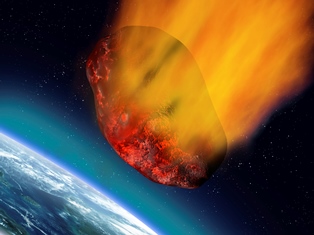The views expressed in our content reflect individual perspectives and do not represent the authoritative views of the Baha'i Faith.

A self-identifying atheist acquaintance — I’ll call him Maynard — posted questions about God on his blog encouraging any believers hanging out there to please answer.
How could I resist?
Maynard asked particularly interesting questions, which most religious people don’t think about all that much. I didn’t. Up until the time I was in my late teens, God was like air, something I depended on being there without giving much thought to its composition.
At eighteen, I seriously questioned my assumptions about things, including God. But by the time I answered Maynard’s questions, I’d spent a significant portion of my life contemplating them and researching the answers.
Maynard asked these questions because he felt “the God hypothesis” wasn’t granular enough. He wanted every detail filled in. An interesting request, in view of the fact that few, if any, scientific hypotheses leap fully formed from even the most advanced minds. Least of all do they leap forth proven, or even with enough evidence to satisfy the scientific community.

Anybody remember back when Walter and Louis Alvarez released their first theories about the KT boundary in 1980? Though they had discovered enough evidence that a large mass had struck the Earth and caused the dinosaur die-off — enough that they were convinced of it — many scientists scoffed openly. The evidence for an impact was circumstantial. No one could observe an asteroid striking the Earth to check the evidence. No one could repair to a laboratory to do controlled experiments. Scientists demanded a smoking gun — or, in this case, a smoking crater. The debate became rancorous, to put it mildly.
The Alvarez’s ideas have since come to be widely accepted as scientific fact. This underscores the strength of the scientific method as a means of studying physical reality and building a body of evidence in support of certain beliefs about it. In my own life, faith has also been about studying reality and building a body of evidence for beliefs about the spiritual world and the human psyche — where the material and spiritual meet.
I have heard several clergymen suggest that the mind is a tool of the devil and that real faith is blind faith. I would propose, rather, that since God gave us minds and encouraged us to use them, He would be pleased if we used them to discover Him with as much zeal as we use to discover the physical laws He set in motion.
Indeed, Baha’i scriptures insist that faith should not be blind because such blindness (not knowing why we believe something) can lead to dogma, fundamentalism, schism, and worse.
So, without further ado, here are the questions Maynard asked the believers who frequented his blog spot:
- Is God a (a) material or (b) non-material entity? (i.e., is God made up of the same kind of stuff like protons, electrons, etc. with properties like mass, charge, spin, etc. that every other thing in the universe is made up of, or is he made of something that is non-material?)
- Does God exist everywhere in space?
- Is God a sentient being like us, with thoughts and feelings?
- Can God change the past?
- Does God know the future?
- Does God know absolutely everything that happens every moment, including every thought of every being?
- Can god intervene in events whenever and wherever, to violate natural laws and change their course (i.e. perform miracles)?
- Do you believe that you have a soul or spirit that will continue to exist in some form (perhaps reincarnated) even after you are dead?
As you can see, a number of these questions deal with the concepts of omniscience and omnipotence. Without actually putting it into words, Maynard posed the age-old theological conundrum: Could God create a rock too heavy for Him to lift? (My answer: Why would He want to?)
The questions draw on a number of assumptions around God’s power and abilities, and whether our concept of something being “made” applies to God. Everything we can perceive has been “made” in some way, and it’s a human assumption that things must exist by being made. In other words, the question assumes that God is made just like everything else in our experience.

Which, of course, leads to the problem of infinite regression and the question: What created God? Stephen Hawking asks the same question — and answers it — when he says that the universe came into being spontaneously because of gravity.
Okay. If I put that in spiritual terms, he’s saying the universe came into being because of love (attractive force). That sounds right. But whose love and for what?
Baha’u’llah wrote (speaking as an Emissary for the God in question):
“I loved thy creation, hence I created thee.”
Which brings us back to the first question about God: What sort of being might God be?
Read the next article in the series: Who is this God Person, Anyway?

















Comments
Sign in or create an account
Continue with Facebookor